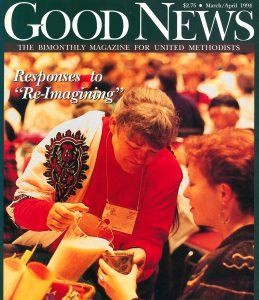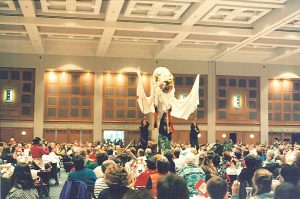 By James V. Heidinger II-
By James V. Heidinger II-
The Re-Imagining Conference was billed as “A Global Theological Conference by Women, for Men and Women.” Held in Minneapolis on November 4–7, 1993, Re-Imagining was an ecumenical gathering associated with the World Council of Churches for those of the feminist, womanist, or lesbian perspective. With some 2,200 registrants from many mainline denominations, 391 were United Methodist. The Women’s Division (of the General Board of Global Ministries) staff and directors were urged to attend the conference as the quadrennium’s theological workshop with Women’s Division staff and directors’ expenses paid for by the division. In fact, at its spring meeting, the Women’s Division took action to cancel its own staff and directors’ theology workshop and approved in its place involvement of staff and directors in the Re-Imagining event. The Women’s Division acknowledged its full financial support of thirty-six directors, nine staff members, and eleven conference vice-presidents, plus a grant of $2,500 for scholarship support. The Women’s Division’s involvement clearly amounted to official support of the event.
The Good News staff read carefully the transcripts and listened to the recordings from most all of the more than 34 presentations, and we were convinced that this was without doubt the most bizarre, theologically aberrant event we had ever read about, far removed from Christian teaching and tradition. Consider just a few examples:
• Womanist theologian Delores S. Williams said, “I don’t think we need a theory of atonement at all … I don’t think we need folks hanging on crosses and blood dripping and weird stuff.” The statement drew enthusiastic applause.
• A United Methodist clergywoman told a workshop, “The Church has always been blessed by gays and lesbians … witches … shamans … artists.”
• Theologian Mary Hunt said, “I have far more hope in substituting ‘friendship’ as a metaphor for family…. Imagine sex among friends as the norm, young people learning to make friends rather than to date. Imagine valuing genital sexual interaction in terms of whether and how it fosters friendship and pleasure.”
• Melanie Morrison, cofounder of Christian Lesbians Out Together (CLOUT), was given time to celebrate “the miracles of being lesbian, out, and Christian,” and invited all other lesbian, bisexual, and transsexual women to come forward, join hands, and encircle the stage. More than one hundred women responded and Morrison said, “I’m pleased and honored to lead you in prayer and to talk to earth maker Mauna, our creator.”
• Nadean Bishop, the first “out” lesbian minister called to an American Baptist church, said that Mary and Martha in the Bible were not actual sisters but lesbian lovers.
• Chung Hyun Kyung, one of the speakers, explained that Asian theology totally rejects the idea of sinful man, propagating the understanding that humans are good and become better from the god within.
• Chinese feminist Kwok Pui Lan told the group “We cannot have one savior — just like the Big Mac in McDonalds, prepackaged, shipped all over the world. It won’t do. It’s imperialistic.” She offered China’s 722 gods and goddesses as an example of “radical inclusivity.”
• Aruna Gnanadason, staff member of the World Council of Churches, said that the church “centered its faith around the cruel and violent death of Christ on the cross, sanctioning violence against the powerless in society.”
• Virginia Mollenkott said, “We would understand Jesus to be our elder brother, the trailblazer and constant companion for us who are here in time and space, but ultimately one among many brothers and sisters in an eternally, equally worthy siblinghood.”
These excerpts reflect the tone and substance of the Re-Imagining Conference. Prayers were offered repeatedly to the goddess Sophia, including the offensive prayer in the communion-like “Service of milk and honey,” which said, “Our sweet Sophia, we are women in your image; with nectar between our thighs we invite a lover, we birth a child.” This blending of sexuality and spirituality seemed more Canaanite than Christian. Not one of more than 34 major speakers represented the orthodox Christian faith as expressed in the classical creeds of the church. The gathering, rather than being ecumenical in terms of focusing on the classic Christian faith, was actually interreligious, with its major emphasis being on non-Christian and other religious traditions.
These excerpts help one understand why the Re-Imagining Conference caused such an ongoing controversy that continued throughout most of 1994. It was a very public conference officially supported by a major United Methodist program agency. It included prayers to and worship focused on the goddess Sophia, as well as the denial of essential Christian doctrinal tenets such as the deity of Christ, his atoning death, the sinfulness of humanity, creation, the authority of Scripture, the church, and the biblical understanding of human sexuality. These doctrines were not only denied, but often done so derisively.
The Good News board took action at its January 1994 meeting, about a month after the conference, asking the Council of Bishops to address this troubling event, believing the conference represented a theological crisis in the church. Our bishops, of course, are charged with the task of guarding the church’s doctrine and teaching. In fact, three retired bishops did speak out. Two invited by Good News (William R. Canon and Earl G. Hunt), wrote articles for Good News magazine. A third, Mack Stokes, penned a lengthy letter to the editor in Good News.
All were deeply distressed about the substance of the conference and its introduction of the goddess Sophia in the worship liturgy. They were retired at the time, but all three went on record publicly, expressing their deep concerns about the conference and Sophia worship.
Unfortunately, the Council of Bishops released no statement about Re-Imagining at its May (1994) meeting but rather created a task force to address the continuing controversy. The task force produced a statement entitled “Biblical Wisdom,” which was adopted unanimously by the Council of Bishops at its November (1994) meeting. The statement noted the existence of considerable theological and doctrinal ferment within The United Methodist Church. Concerning the matter of Sophia, it did state that “Woman Wisdom was never an object of cultic reverence for the Israelites and there are no Biblical warrants for goddess worship.” It went on to affirm that “the worship of Sophia as a goddess is contrary both to the Biblical revelation and our doctrinal standards.” This was a welcomed word for evangelicals to hear. Unfortunately, however, there was no reference to any of the egregious attacks on and denials of the historic doctrines of the church.
Most evangelicals believed that the radical doctrinal views expressed at Re-Imagining were not representative of most United Methodist women in our local church units. Many of them were also distressed by what they heard, but often found it difficult to believe their leadership in New York would be supportive of such a conference. Within two months, UMW leadership released “A Time of Hope – A Time of Threat,” a statement boldly defending the Re-Imagining Conference and claiming critics were denying women the right to do theology.
Then at the November meeting, where the council approved the “Biblical Wisdom” statement, the new president of the council said in his opening address that the bishops needed to help church members get past the “gnat-camel” syndrome (citing Jesus’ rebuke of the scribes and Pharisees for “strain[ing] out a gnat but swallow[ing] a camel” in Matthew 23:24).
He reported receiving hundreds of letters protesting United Methodist involvement in the controversial Re-Imagining Conference — letters expressing concern that some United Methodists had given up devotion to Jesus to worship the goddess Sophia. He went on to say dismissively that he had looked around and did not find one person who had left their devotion to Jesus to worship Sophia. The implication was that the entire matter was of little seriousness, more of a “gnat-camel” kind of issue. His point was that those of us who were upset about Re-Imagining were like the teachers of the law and Pharisees, focusing on minor and insignicant matters while neglecting the more important matters of the law. He said what he did see were drug sales on the streets and children at risk in their schools, concluding: “These are some of the things God is calling us to deal with, but we spend a lot of time fussing within our family. God is calling us to quit that.”
This was a clear example of the trivialization of the role of doctrine in the church: very serious matters, such as goddess worship, the atonement, the incarnation, the sinfulness of humanity, and the deity of Jesus Christ, that resulted in a year-long controversy were viewed merely as “gnat-camel” concerns. According to the president of the United Methodist Council of Bishops, these doctrinal concerns were things we really shouldn’t be “fussing” about within our church family. We should not focus unduly on the president of the council about his statement, because the address of the council’s president generally reflects the consensus of the entire council. But to say we shouldn’t be “fussing” about these kinds of doctrinal issues reflects a serious diminution of the importance and place of doctrine in the church’s life and ministry.

Re-Imagining Conference. Photo by Presbyterian Lay Committee.
Again, the statement by the council’s task force avoided any comment or criticism about the numerous non-Christian teachings at Re-Imagining, including the derision and denial of major Christian doctrines. Many wondered at the time, “If our bishops will not address the many egregious denials of Christian doctrine expressed at the Re-Imagining event, is there any aberration or doctrinal denial they would speak out against in defense of our United Methodist doctrinal standards?” This was all the more disappointing when we reflect that our bishops are charged with being the guardians of the church’s doctrine.
This national conference and our leaders’ reaction to it left many of us even more convinced that matters of doctrine have, indeed, been relegated to a secondary, tangential place in the life of our church.
A Candid Admission
In the Winter 1995 issue of Open Hands, the pro-gay/lesbian journal of the Reconciling Congregations program at the time, Tom Griffith, then pastor of Crescent Heights United Methodist Church in West Hollywood, California, wrote a remarkably candid article entitled, “Three Cheers for Our Evangelical Brothers and Sisters.” Why the praise? Because with our evangelical concerns for “belief in Scriptures and the normative creeds and confessions of faith of the church,” they are calling us to be honest, wrote the Rev. Griffith.
Griffith went on to write, “Now it is our turn to get honest. Although the creeds of our denomination pay lip service to the idea that Scripture is ‘authoritative’ and ‘sufficient both for faith and for practice,’ many of us have moved far beyond that notion in our theological thinking.” Griffith’s words reflected a degree of candor that most evangelicals had never heard before. He wrote, “We are truly deceiving ourselves — and lying to our evangelical brothers and sisters — when we deny the shift we have made.” What Griffith wrote helps us better understand why the Towers Watson Congregational Vitality research study found a persistent lack of trust within the denomination. Griffith got even more specific: “We [liberals] have moved far beyond the idea that the Bible is exclusively normative and literally authoritative for our faith … Furthermore, few of us retain belief in Christ as the sole way to salvation. We trust that God can work under many other names and in many other forms to save people. Our views have changed over the years and evangelicals know it. At least they have the honesty to call us to honesty.”
His candor is commendable. He put his finger on what many of us evangelicals have suspected, and witnessed, for many years — that a number of United Methodist clergy who were trained in the liberal theological tradition may not affirm much of the substance of classic Christianity. Actually, it was not a risky thing for Griffith to write so candidly, because he served in the California-Pacific Annual Conference, one of United Methodism’s most liberal annual conferences. But what it makes clear is that for many liberals, the substance of their preaching is not the great doctrinal themes of the faith: redemption, justification, atonement, sanctification, the Great Commission, and the promised return of Christ. It is not “the faith that was once for all entrusted to the saints” (Jude 3).
It is a trivialization of the church’s doctrine when it can be so casually put aside for something newer, more supposedly relevant and in touch with the times. The claim to have “moved far beyond” Scripture leaves clergy and theologians who do so at liberty to refashion and create a new message free from normative biblical standards. Thus, other things are being preached, much of which would no doubt include good advice, helpful counsel, and words of encouragement and warm religious sentiment. The problem is —these other things are not the faith proclaimed by the church for nearly two millennia. They are not the great doctrinal themes of the great tradition of the church. Nor are these liberal pastors being faithful to the ordination covenant in which they personally affirmed the church’s doctrines to be in harmony with the Scriptures and thus pledged publicly to preach and maintain those doctrines. Griffith knew this, admitting that for many/most liberals, Scripture is no longer “normative” or “sufficient” for faith and practice. That is a notion they have “moved far beyond,” and Griffith was saying it is time for “us liberals” to get honest with evangelicals and admit it.
James V. Heidinger II is the publisher and president emeritus of Good News. A clergy member of the East Ohio Annual Conference, he led Good News for 28 years until his retirement in 2009. Dr. Heidinger is the author of several books, including the recently published The Rise of Theological Liberalism and the Decline of American Methodism (Seedbed). This essay is excerpted from that volume with permission.






We don’t even need to distill things to the point of Doctrine. Scripture itself directly and explicitly condemns these people. Galatians 1:6-9: ” I am astonished that you are so quickly deserting him who called you in the grace of Christ and are turning to a different gospel– Not that there is another one, but there are some who trouble you and want to distort the gospel of Christ. But eve if we or an angel from heaven should preach to you a gospel contrary to the one we preached to you, let him be accursed. As we have said before, so now I say again: If anyone is preaching to you a gospel contrary to the one you received, let him be accursed.” It does not get more clear than this. These perversions of the gospel should not have been tolerated at the time, and they cannot be tolerated now.
I wish you would have referred to the remainder of Jude in this piece because it offers an insightful look into the doctrinal stances of the United Methodist Church right now. Jude 3-4: “Beloved, although I was very eager to write to you about our common salvation, I found it necessary to write appealing to you to contend for the faith that was once for all delivered to the saints. For certain people have crept in unnoticed who long ago were designated for this condemnation, ungodly people, who pervert the grace of our God into sensuality and deny our only Master and Lord, Jesus Christ.” The above statements reported do not belong to Christianity, much less ANY denomination therein. It is incumbent upon us to condemn these statements and in the words of Paul (1 Corinthians 5:4-5), “When you are assembled in the name of the Lord Jesus, you are to deliver this man to Satan for the destruction of the flesh, so that his spirit may be saved in the day of the Lord.” True, godly, biblical love can do nothing else.